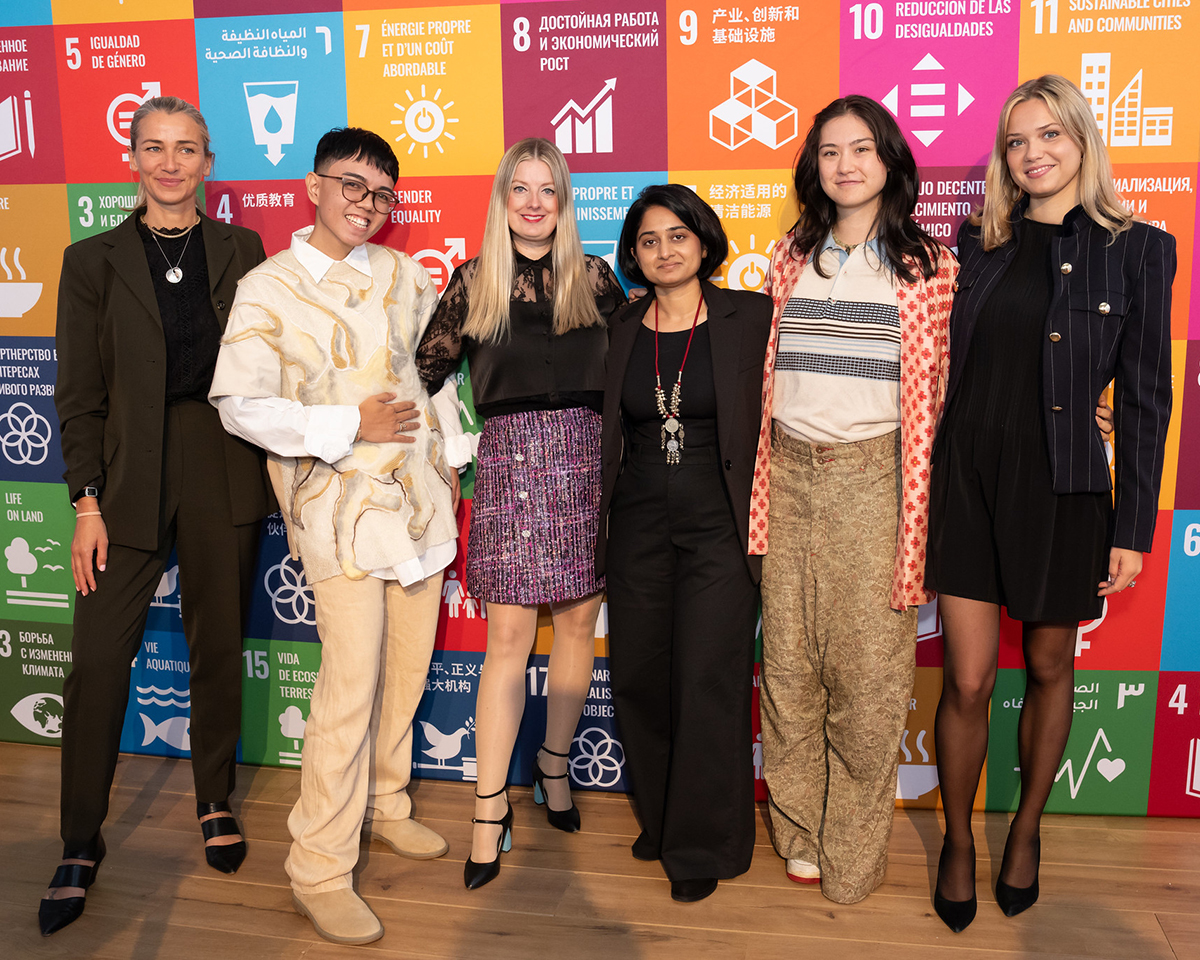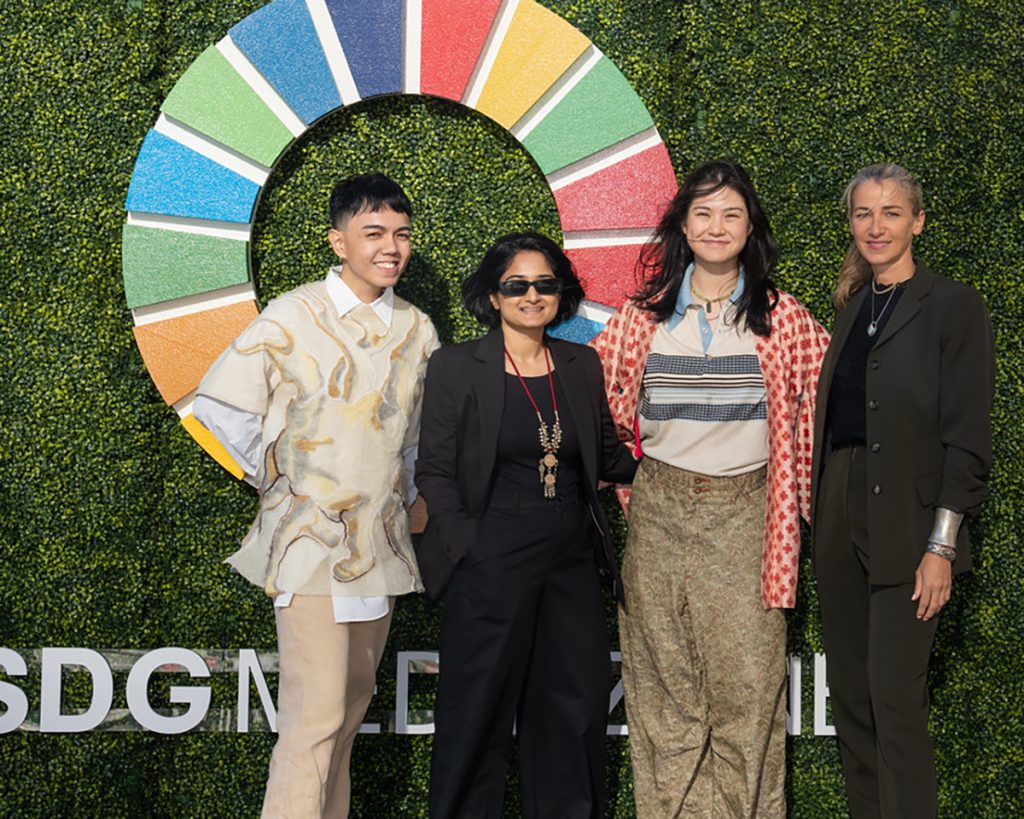Redress, an Asia-focused NGO working to accelerate circular fashion, in cooperation with the United Nations Fashion and Lifestyle Network (UNFLN) co-organized a delegation and panel discussion during the UN General Assembly. The panel consisted of fashion designer activists representing India, the Philippines, and the USA, who participate in the Sustainable Development Goals (SDG) Media Zone.
With the mainstream global fashion industry slow to adopt wide-spread sustainable and ethical responses to fashion pollution, the delegation called for support more established ethical and responsible fashion and lifestyle brands to work to achieve the SDGs proposed by Redress.
Fashion activists on the designer-led industry panel discussion, Damini Mittai (India), Jann Christian Lim Bungcaras (Philippines) and Isabella Li Kostrzewa (USA), discussed their work which has been focused on key global fashion themes, including intersectional environmental justice, cultural identity, social inequality, gender inequality, overconsumption and textile waste colonialism.
“Fashion must be more than just creativity and commerce,” said Dr. Christina Dean, Founder of Redress. “Fashion needs more of an ethical heart and soul to address our planetary challenges. There are countless inspiring brands globally making more than just clothes; they are making positive impacts at various Sustainable Development Goals. From consumers to investors, we must spotlight and empower these businesses to give them a rightful seat at the global fashion table.”
“As the United Nations Secretary-General reminded us on the International Day of Zero Waste, fashion must make good sense for both people and planet,” said Kerry Bannigan, Co-Founder of the United Nations Fashion and Lifestyle Network and President of the Board, PVBLIC Foundation. “Fashion significantly influences numerous aspects of society, from employment and gender equality to innovation and cultural expression. The choices we make in this sector today profoundly affect the world we live in tomorrow.”
Redress’ global network of ethical fashion designers, who are Alumni of the world’s largest sustainable fashion design competition, the Redress Design Award, were invited to join the UNFLN. The goal is to bring more fashion advocates, particularly those from Asia, into the UNFLN’s global network and to encourage industry stakeholders to demonstrate solutions and scale their impact. Through convenings, education and advocacy, Redress and UNFLN say they will continue to highlight sustainable practices and empower businesses to lead change.
Asia is pivotal in achieving fashion’s global sustainability efforts. Asia accounts for some 60% of global exports of garments and textiles, with approximately 60 million workers being employed in Asia’s garment manufacturing. Asia is also hit hardest by climate change, with the region heating up faster than the global average. Asia-focused Redress’ Alumni designers primarily come from Asia.
Damini Mittai, Founder and Designer, Koaka Collective, India, said “My work with marginalised female rural communities in India aims to foster sustainable livelihoods through skills-building and collective action, working against gender equality and the injustice of climate change.”
Jann Christian Lim Bungcaras, Founder, Creative Director and Designer, Jann Bungcaras Fashion House, Philippines, said “The Philippines is awash with a modern textile waste colonialisation, from post consumer to industry waste, and as a developing country, we should not be seen as a dumping ground for waste.”
Isabella Li Kostrzewa, Artist, Isboko, USA, said “Here in my own country of USA, we have a gluttony of fashion overconsumption and we urgently need to inspire fashion consumers toward healthier fashion choices.”
 Redress Alumni designers who have joined the UNFLN are: Damini Mittai (India), Jann Bungcaras (Philippines), Isabella Li Kostrzewa (USA), Aashita Jain (India), Ruyin Tian (China), Aarushi Kilawat (India), Ruwanthi Gajadeera (Sri Lanka); and from around the world Lívia Aguiar de Castro (Brazil), Louise Boase (Australia), Rachel Clowes (UK), Rose Brown (UK), Magdalena Malbran (Argentina), and Silvia Acién Parrilla (Spain).
Redress Alumni designers who have joined the UNFLN are: Damini Mittai (India), Jann Bungcaras (Philippines), Isabella Li Kostrzewa (USA), Aashita Jain (India), Ruyin Tian (China), Aarushi Kilawat (India), Ruwanthi Gajadeera (Sri Lanka); and from around the world Lívia Aguiar de Castro (Brazil), Louise Boase (Australia), Rachel Clowes (UK), Rose Brown (UK), Magdalena Malbran (Argentina), and Silvia Acién Parrilla (Spain).
Together, they represent a growing movement of ethical and responsible businesses showing that sustainable fashion can scale beyond individual projects into systemic industry transformation.

